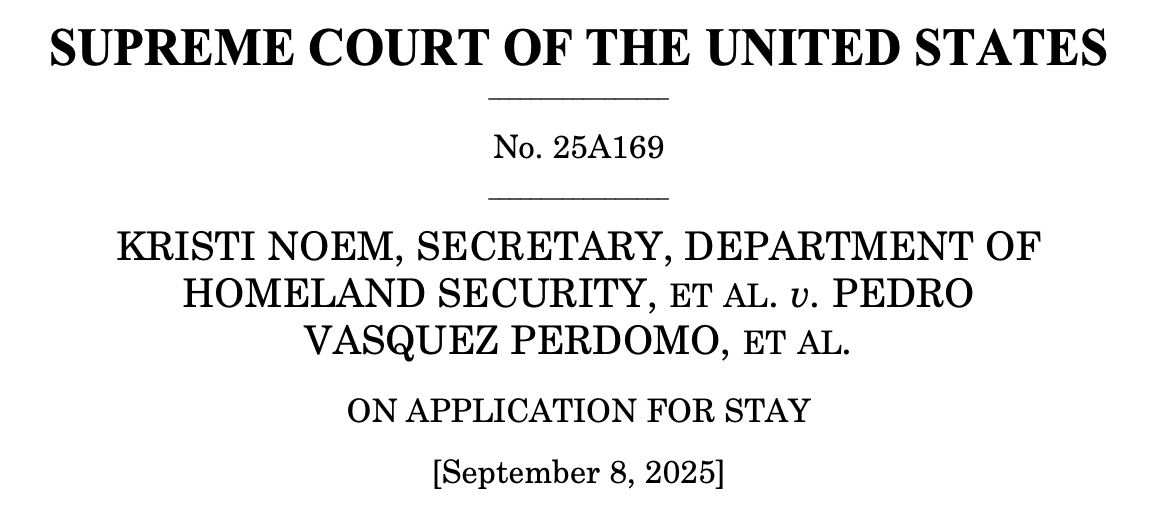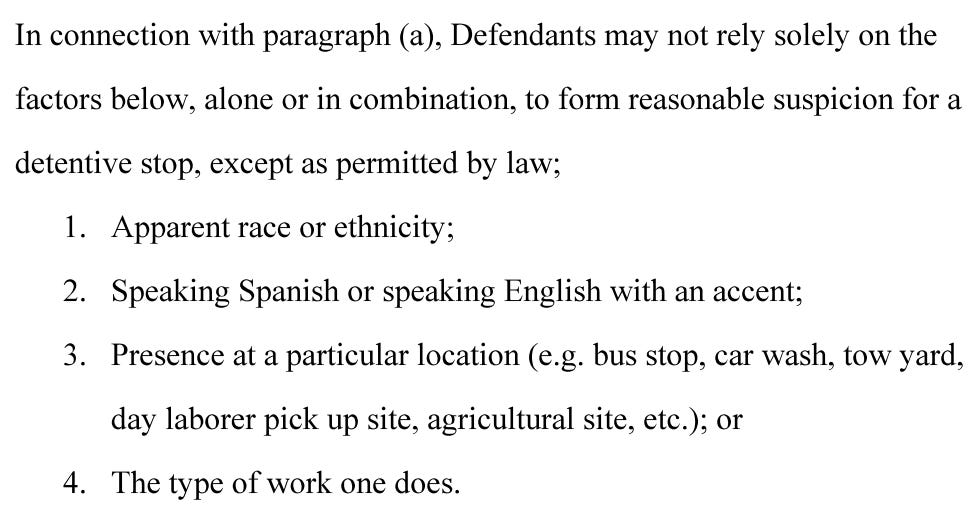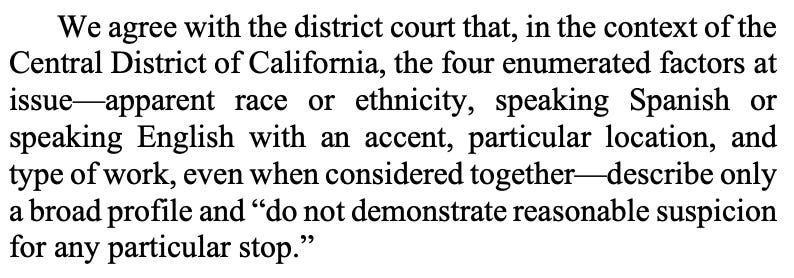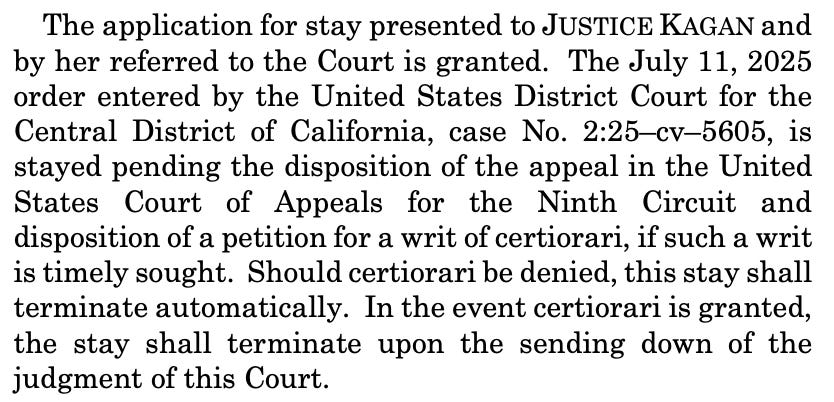SCOTUS conservatives OK Trump admin's racial profiling of Latinos in low-wage jobs
Five of the six Republican appointees to the Supreme Court wrote nothing Monday. But their actions, and Justice Kavanaugh's concurrence, paint an alarming picture.
On Monday morning, the U.S. Supreme Court’s right-wing majority allowed the Trump administration, as part of its sweeping immigration raids, to racially profile Spanish-speaking people who look Latino at certain low-wage job sites in the Los Angeles area while litigation challenging the raids is ongoing.
It is an order that makes a mockery of the Fourth Amendment’s protections against unreasonable searches or seizures, with significant worrying consequences for all people in America — whether you lack documentation to be in this country or are a citizen of it. Beyond the practical consequences, however, the existence of the Supreme Court order itself is alarming.
Monday’s action was allowed by way of a one-paragraph order that contained no reasoning — contrary to the July district court order at issue and the August appellate decision denying the government’s stay request, both of which were more than 50 pages long and detailed their reasoning at length.
Justice Sonia Sotomayor, joined by Justices Elena Kagan and Ketanji Brown Jackson, strongly dissented, accusing the majority of “yet another grave misuse of our emergency docket.“
The only Republican appointee to write anything on Monday was Justice Brett Kavanaugh — and he did nothing to suggest that this was a reasoned, let alone correct, decision.
As U.S. District Judge Maame Ewusi-Mensah Frimpong, a Biden appointee, explained the case in her July order, the issue before the court at that point was whether the challengers were likely to prove “that the federal government is indeed conducting roving patrols without reasonable suspicion and denying access to lawyers.“ She continued: “This Court decides—based on all the evidence presented—that they are.“
As such, she ordered that the administration stop detaining people in the Central District of California — which includes Los Angeles — based solely on four factors:
As the Ninth Circuit detailed in its unanimous opinion — from Judges Ronald Gould (Clinton), Marsha Berzon (Clinton), and Jennifer Sung (Biden) — denying the Justice Department’s request for a stay of that order pending appeal:
Both of those decisions, again, were parts of opinions that went on for more than 50 pages, detailed the specific circumstances at issue here, and applied Fourth Amendment law to the challengers’ claims in those circumstances.
On Monday, though, this is all the Supreme Court gave in blocking Frimpong’s order:
In dissent, Sotomayor wrote for the Democratic appointees, “We should not have to live in a country where the Government can seize anyone who looks Latino, speaks Spanish, and appears to work a low wage job. Rather than stand idly by while our constitutional freedoms are lost, I dissent.“
The Supreme Court majority, however, gave the administration power to conduct its aggressive raids with no end in sight given that, under the Supreme Court order, the district court’s order is stayed while the U.S. Court of Appeals for the Ninth Circuit hears its appeal and, after that, while the Supreme Court considers hearing any subsequent appeal.
The implications of Monday’s order are frightening.
Compare this note from Sotomayor’s dissent …
Another Latino U. S. citizen similarly “worries that as a visibly Latino man, he could be detained” if he does not carry his passport, but “decided against [doing so] because he believes that as an American, he should not have to live like that in his own country.”
… with this actual statement from Kavanaugh, a Senate-confirmed associate justice of the Supreme Court of the United States who voted with the majority:
[A]s for stops of those individuals who are legally in the country, the questioning in those circumstances is typically brief, and those individuals may promptly go free after making clear to the immigration officers that they are U. S. citizens or otherwise legally in the United States.
In other words, Kavanaugh apparently believes the citizen referenced by Sotomayor should have to live like that in his own country.
Kavanaugh’s opinion, concurring with the order granting the stay, continues like that throughout its 10 pages. It was at varying points racist, ignorant, privileged, lawless, or some combination of the four.
This is how Kavanaugh himself characterizes the action he voted to permit on Monday:
The Government sometimes makes brief investigative stops to check the immigration status of those who gather in locations where people are hired for day jobs; who work or appear to work in jobs such as construction, landscaping, agriculture, or car washes that often do not require paperwork and are therefore attractive to illegal immigrants; and who do not speak much if any English.
In short, racial profiling of people seeking low-wage work is fine, constitutionally speaking, for the justice who was aghast earlier this year, constitutionally speaking, that children in Montgomery County schools might have to hear about the existence of gay and transgender people.
Later, Kavanaugh got more specific about the classist racism at work in his vote. Of those four factors at issue, when considered in “the Los Angeles area” at issue in the case, Kavanaugh wrote:
Under this Court’s precedents, not to mention common sense, those circumstances taken together can constitute at least reasonable suspicion of illegal presence in the United States.
“Common sense.” And, not even reasonable suspicion. “[A]t least reasonable suspicion.“ In other words, Kavanaugh believes it is common sense — and that there likely is more than reasonable suspicion — that a person who looks Latino and has an accent at a low-wage job site in Los Angeles is in America without legal documentation.
Remember, this is not some insignificant discussion. Kavanaugh is stating this as his view of constitutional law — about the Fourth Amendment’s protections.
As Sotomayor countered in her 21-page dissent:
The Government has provided no evidence showing that its seizures were based on credible intelligence about a particular employer at a particular location. Indeed, the Government submitted no evidence about what facts its agents relied upon to conduct most of the seizures documented in the record. Rather, its declarations suggest that the Government generally targeted locations based on the “types of businesses” that, in the agents’ generalized experiences, undocumented immigrants supposedly frequent. …. That is plainly insufficient to give rise to a “particularized and objective basis for suspecting [a] particular person” under the Fourth Amendment.
And yet, the Supreme Court’s majority allowed such seizures to resume.
What’s more, five justices — Chief Justice John Roberts and Justices Clarence Thomas, Sam Alito, Neil Gorsuch, and Amy Coney Barrett — provided no explanation for their vote on Monday.
Although we technically do not know everyone’s votes — we only know that at least four of them voted with Kavanaugh to grant the stay — none of the five voiced their opposition to Monday’s decision. It was a stark decision that would seem to be the type to merit at least noting your dissent if you disagreed with it.
No one did so, and the Trump administration will certainly feel accordingly empowered to act with even greater disregard for people’s Fourth Amendment rights going forward.
The only good news to take out of Monday’s order — such as it is — is Sotomayor’s repeated reminder that Kavanaugh was not writing a majority opinion with his concurrence. It is, she was subtly reminding people (including the lawyers bringing cases and lower court judges), just one guy’s opinion. The only “majority” is the order staying the opinion in this case. There is no majority reasoning and, as such, no “precedent” for Gorsuch to later claim is being “def[ied]” in a later case.
It is slight comfort, to be sure, but it is what it is.







The Supreme Court is finished as a legitimate institution. The Republican “justices” are aiding and abetting a coup. They should be treated as the traitors and cowards that they are.
Kavanaugh at times cares about racism. Not today.
[See, e.g., his concurring opinion in Ramos v. Louisiana.]
Kavanaugh's concurrence sounds like ill-advised mansplaining.